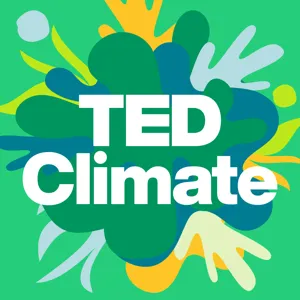Podcast Summary
Promoting Electrification and Combating Climate Change: Monica Araya's Drive Electric campaign advocates for all new vehicles to be electric, TED's Audacious Project supports this global action, and the Climate 1 podcast offers insightful conversations on climate change responses.
There are various initiatives underway to promote electrification of transportation and combat climate change. Monica Araya, an electrification advocate, shares her work on the Drive Electric campaign, which aims to make all new vehicles electric to retire the old polluting internal combustion engines. Meanwhile, TED's Audacious Project has made a significant funding commitment to support this global action. Additionally, for those looking to deepen their understanding of climate change, the "Climate 1" podcast offers insightful conversations with experts, activists, politicians, and artists. These discussions cover various aspects of climate change and provide valuable perspectives on how our world is responding to this crisis. In summary, there are numerous efforts being made to address climate change, and staying informed through resources like the Drive Electric campaign and the Climate 1 podcast can help individuals make a difference.
Addressing emissions from cars, trucks, and buses: Engage cities, politicians, companies, and citizens to create political space for stricter regulations and policies to tackle emissions from cars, trucks, and buses, building on each other's initiatives.
Addressing the massive emissions from cars, trucks, and buses requires working on multiple fronts simultaneously. Monica Araya, a distinguished fellow at the ClimateWorks Foundation, emphasizes the need for system change at a large scale and at a fast pace. This means engaging with cities, politicians, companies, and citizens to create political space for stricter regulations and policies. Each initiative builds on the others. For instance, if cities ban petrol and diesel cars, politicians enact stricter regulations, companies switch to cleaner alternatives, and citizens demand change, automakers will have to follow suit. It's a complex issue that requires tackling from multiple angles at once.
Drive Electric campaign pushing for ban on petrol and diesel car sales: The Drive Electric campaign, a coalition of 70+ orgs, is urging governments and industries to ban petrol/diesel car sales by 2035, with earlier deadlines for buses and trucks. The next 5 years are crucial for this transition, which is happening globally.
The Drive Electric campaign, a coalition of over 70 organizations, is making significant strides in persuading governments and industries around the world to phase out sales of petrol and diesel cars by setting clear timelines. This year, the European Commission proposed a ban on such sales after 2035, a development that was unthinkable just two years ago. The coalition's overall goal is to persuade the world to adopt this transition, with different segments such as buses and trucks targeted for earlier deadlines. The next five years are critical to achieving this tipping point, and while some may argue that the move to electrification is already inevitable, the coalition emphasizes the importance of timely action to promote early adoption. The coalition's efforts have been instrumental in pushing for this transition, and the progress is happening globally, from Europe to China and beyond.
Accelerating the transition to electric vehicles by two decades: The Drive Electric campaign aims to save approximately 160 gigatons of CO2 equivalent, equivalent to three years' worth of global emissions, by accelerating the transition to electric vehicles. To achieve this, the coalition needs to grow its partners and secure $1 billion in funding over the next five years.
The Drive Electric campaign aims to accelerate the transition to electric vehicles by two decades, saving approximately 160 gigatons of CO2 equivalent, which is more than three years' worth of global emissions. However, this ambitious goal faces significant opposition from industries generating trillions of dollars in revenue annually. To achieve this, the coalition needs to grow its partners and secure funding of around $1 billion over the next five years. This is a significant ask from philanthropists, but the potential impact on reducing carbon emissions makes it a worthwhile investment.
Coalition invests $300M towards electric vehicles and carbon reduction in transportation: A $300M investment brings us halfway to a $1B goal for electric vehicles and reducing carbon emissions in transportation. Individuals can also contribute by advocating, sharing info, and not buying internal combustion cars.
A coalition of organizations and donors, including Drive Electric, TED, Countdown, and The Audacious Project, have committed over $300 million towards the goal of transitioning to electric vehicles and reducing carbon emissions in transportation. This brings us over halfway to the $1 billion goal. With this significant investment, the campaign is now unstoppable, and it comes at an opportune time as we approach COP. Individuals can also make a difference by advocating for green zones, raising government ambition, not buying internal combustion cars, sharing information, and urging companies to make the transition. Together, we can change transportation and demonstrate how systems change works in practice. The campaign is not just about the benefits of electric vehicles for people and the planet, but also about showing how large-scale change can be achieved. Let's work together and make it happen.






